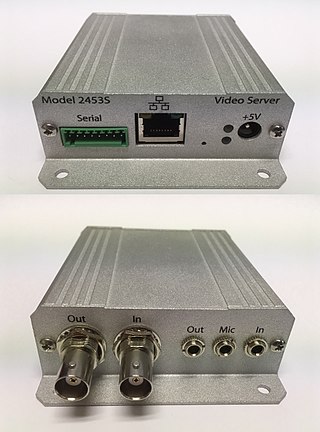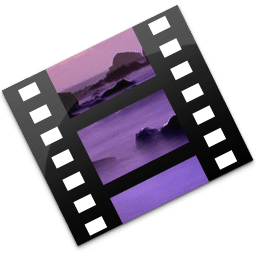A media clip is a short segment of electronic media, either an audio clip or a video clip.
Media clips may be promotional in nature, as with movie clips. For example, to promote upcoming movies, many actors are accompanied by movie clips on their circuits. Additionally, media clips may be raw materials of other productions, such as audio clips used for sound effects.

Video editing software or a video editor is software used for performing the post-production video editing of digital video sequences on a non-linear editing system (NLE). It has replaced traditional flatbed celluloid film editing tools and analog video tape editing machines.

Non-linear editing is a form of offline editing for audio, video, and image editing. In offline editing, the original content is not modified in the course of editing. In non-linear editing, edits are specified and modified by specialized software. A pointer-based playlist, effectively an edit decision list (EDL), for video and audio, or a directed acyclic graph for still images, is used to keep track of edits. Each time the edited audio, video, or image is rendered, played back, or accessed, it is reconstructed from the original source and the specified editing steps. Although this process is more computationally intensive than directly modifying the original content, changing the edits themselves can be almost instantaneous, and it prevents further generation loss as the audio, video, or image is edited.
A sound bite or soundbite is a short clip of speech or music extracted from a longer piece of audio, often used to promote or exemplify the full length piece. In the context of journalism, a sound bite is characterized by a short phrase or sentence that captures the essence of what the speaker was trying to say, and is used to summarize information and entice the reader or viewer. The term was coined by the U.S. media in the 1970s. Since then, politicians have increasingly employed sound bites to summarize their positions, gone out of their way to prevent sound bites being made from interview audio and video.
A music video is a video that integrates a song or an album with imagery that is produced for promotional or musical artistic purposes. Modern music videos are primarily made and used as a music marketing device intended to promote the sale of music recordings. These videos are typically shown on music television and on streaming video sites like YouTube, or more rarely shown theatrically. They can be commercially issued on home video, either as video albums or video singles. The format has been described by various terms including "illustrated song", "filmed insert", "promotional (promo) film", "promotional clip", "promotional video", "song video", "song clip", "film clip", "video clip", or simply "video".
Short-form content are short videos, which usually contain witless jokes and/or funny clips, often from movies or entertainment videos such as those on YouTube. Since the early 2020s, short-form content has surged in popularity, particularly among Generation Z and Alpha with the emergence of TikTok, Instagram Reels, and YouTube Shorts shaping internet culture. Video clips are usually taken out of context and are made into memes. Sometimes short-form content can be used to attract the public to the user's other accounts or their long-form videos. The term is also used more loosely to mean any video program, including a full program, uploaded onto a website or other medium.

iMovie is a free video editing application made by Apple for the Mac, the iPhone, and the iPad. It includes a range of video effects and tools like color correction and image stabilization, but is designed to be accessible to users with little or no video editing experience. iMovie's professional equivalent is Apple's Final Cut Pro X.
The following is a list of video-related topics.

Final Cut Pro is a professional non-linear video-editing application initially developed by Macromedia, and, since 1998, by Apple as part of its pro apps collection. Final Cut Pro allows users to import, edit, and process video footage, and output it to a wide variety of formats.

MicroMV is a proprietary videotape format introduced in October 2001 by Sony. It is the smallest videotape format — 70% smaller than MiniDV or about the size of two US quarter coins; it is also smaller than a Digital8 or DV cassette and slightly smaller than an audio microcassette. It was the first helical scan tape system using MR read head introduced to the market. Each cassette can hold up to 60 minutes of video.

A video server is a computer-based device that is dedicated to delivering video. Video servers are used in a number of applications, and often have additional functions and capabilities that address the needs of particular applications. For example, video servers used in security, surveillance and inspection applications typically are designed to capture video from one or more cameras and deliver the video via a computer network. In video production and broadcast applications, a video server may have the ability to record and play recorded video, and to deliver many video streams simultaneously.
Adobe Premiere Pro is a timeline-based non-linear video editing application developed by Adobe Inc. and distributed through the Adobe Creative Cloud licensing program. Initially released in 2003, it succeeded Adobe Premiere, which was first introduced in 1991. Premiere Pro is designed for professional video editing, whereas related product Premiere Elements is aimed at the consumer market.

Windows Movie Maker is a discontinued video editing software program by Microsoft. It was first included in Windows Me on September 14, 2000, and in Windows XP on October 25, 2001. It later became a part of the Windows Essentials software suite, and offered the ability to create and edit videos as well as to publish them on OneDrive, Facebook, Vimeo, YouTube, Windows Live Groups, and Flickr. It is comparable to Apple's iMovie.
A re-cut trailer, or retrailer, is a mashup video that uses footage from a movie or its original trailers to create a completely new context, or one different from the original source material. The mashups are parody trailers that derive humor from misrepresenting original films: for instance, a film with a murderous plot is made to look like a comedy, or vice versa. They became popular on the Internet in 2005.
"Push" is a song from the Enrique Iglesias album Insomniac. The song features American rapper Lil Wayne and is Iglesias's first collaboration with a hip-hop artist.
.m2ts is a filename extension used for the Blu-ray disc Audio-Video (BDAV) MPEG-2 Transport Stream (M2TS) container file format. It is used for multiplexing audio, video and other streams, such as subtitles. It is based on the MPEG-2 transport stream container. This container format is commonly used for high-definition video on Blu-ray Disc and AVCHD.

Trilulilu was the biggest user-generated content (UGC) website in Romania on which users could view, upload and share videos, images and audio files. The website was created on January 22, 2007, after a few weeks of beta testing, by two Romanian entrepreneurs Sergiu Biriş and Andrei Dunca. In May 2008 the French businessman Alexis Bonte bought 41% of the company for around US$1.5 million, and with the previous 10% that he owned became the largest shareholder.

AVS Video Editor is a video editing software published by Online Media Technologies Ltd. It is a part of AVS4YOU software suite which includes video, audio, image editing and conversion, disc editing and burning, document conversion and registry cleaner programs. It offers the opportunity to create and edit videos with a vast variety of video and audio effects, text and transitions; capture video from screen, web or DV cameras and VHS tape; record voice; create menus for discs, as well as to save them to plenty of video file formats, burn to discs or publish on Facebook, YouTube, Flickr, etc.

Flowblade Movie Editor is a free and open-source video editing software for Linux.

Ogelle was an online video-sharing platform headquartered in Nigeria. Ogelle was launched on 18 April 2019, during the official launch in Lagos, Nigeria. As of April 2024, Ogelle's website was no longer live.